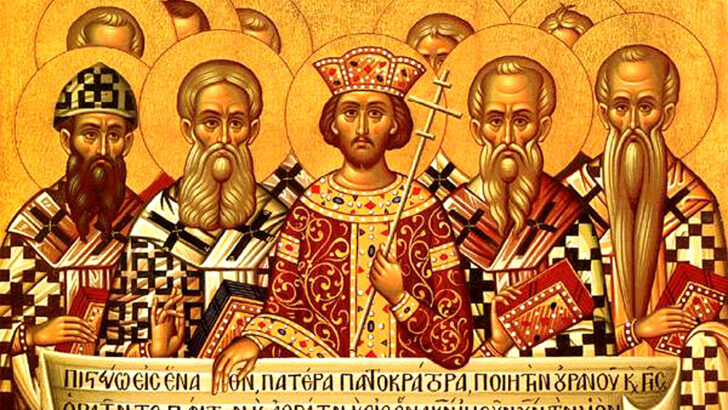Creeds ground us. Within a short formula they summarise the main tenets of our faith and keep us mindful of the truths that anchor us.
As a Christian, I pray two creeds, The Apostles’ Creed and The Nicene Creed. But I also pray another creed which grounds me in some deep truths which are not always sufficiently recognised as inherent in our Christian creeds. This creed, given in the Epistle to the Ephesians, is stunningly brief and simply reads: There is one Lord, one faith, one baptism, one God who is Father of us all.
That’s a lot in a few words! This creed, while Christian, takes in all denominations, all faiths, and all sincere persons everywhere. Everyone on the planet can pray this creed because ultimately there is only one Lord, one faith, one baptism, and one God who created and loves us all.
This has far-reaching consequences for how we understand God, other Christian denominations, other faiths, sincere non-believers, and ourselves. There is only one God, no matter our denomination, particular faith, or no explicit faith at all. The one same God is the loving creator and parent of everyone. And that one God has no favourites, doesn’t dislike certain persons, denominations, or faiths, and never disdains goodness or sincerity, no matter their particular religious or secular cloak.
Coexistence
And these are some of the consequences: First, Jesus assures us that God is the author of all that is good. In addition, as Christians we believe that God has certain transcendental attributes, namely, God is one, true, good, and beautiful. If that is true (and how could it be otherwise?), then everything we see in our world that is integral, true, good, or beautiful, whatever its outward label (Roman Catholic, Protestant, Evangelical, Jewish, Hindu, Buddhist, Muslim, New Age, Neo-Pagan, or purely Secular), comes from God and must be honoured.
We do need to safeguard precisely the truths expressed in our creeds and not slide into an amorphous syncretism in which everything is relative”
John Muir once challenged Christianity with this question: “Why are Christians so reluctant to let animals into their stingy Heaven?” The creed in the Epistle to the Ephesians asks something similar: Why are Christians so reluctant to let other denominations, other faiths, and good sincere people without explicit faith into our stingy concept of God, Christ, faith, and the Church? Why are we afraid of faith fellowship with Christians of other denominations? Why are we afraid of faith fellowship with sincere Jews, Muslims, Hindus, Buddhists, and New Age religious? Why are we afraid of paganism? Why are we afraid of natural sacraments?
There can be good reasons. First, we do need to safeguard precisely the truths expressed in our creeds and not slide into an amorphous syncretism in which everything is relative, where all truths and all religions are equal, and the only dogmatic requirement is that we be nice to each other. Although there is, in fact, something (religious) to be said about being nice to each other, the more important point is that embracing each other in faith fellowship is not saying that all faiths are equal and that one’s particular denomination or faith tradition is unimportant. Rather it is acknowledging (importantly) that, at the end of the day, we are all one family, under one God, and that we need to embrace each other as brothers and sisters. Despite our differences, we all have the same radical creed.
Then too, as Christians, we believe that Christ is the unique mediator between God and ourselves. As Jesus puts it, “no one goes to the Father, except through me.” If that is true, and as Christians we hold that as dogma, then where does that leave Hindus, Buddhists, Taoists, Jews, Muslims, New Agers, Neo-Pagans, and sincere non-believers? How do they share the kingdom with us Christians since they do not believe in Christ?
Expression
As Christians, we have always had answers to that question. The Catholic catechisms of my youth spoke of a “baptism of desire” as a way of entry into the mystery of Christ. Karl Rahner spoke of sincere persons being “anonymous Christians”. Frank de Graeve spoke of a reality he called “Christ-ianity”, as a mystery wider than historical “Christianity”; and Pierre Teilhard de Chardin spoke of Christ as being the final anthropological and cosmological structure within the evolutionary process itself. What all of these are saying is that the mystery of Christ cannot be identified simplistically with the historical Christian churches. The mystery of Christ works through the historical Christian churches but also works, and works widely, outside of our churches and outside the circles of explicit faith.
Christ is God and therefore is found wherever anyone is in the presence of oneness, truth, goodness, and beauty. Kenneth Cragg, after many years as a missionary with the Muslims, suggested that it is going to take all the religions of the world to give full expression to the full Christ.
There is one Lord, one faith, one baptism, one God who is Father of us all – and so we should not be so reluctant to let others, not of our own kind, into our stingy Heaven.


 Fr Ronald Rolheiser
Fr Ronald Rolheiser
